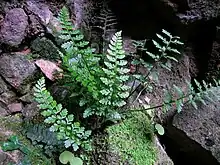Asplenium cimmeriorum, commonly known as the cave spleenwort, is a species of small fern in the family Aspleniaceae. Endemic to New Zealand, they are only found in the western coasts, from Waitomo in the North Island, to Punakaiki in the South Island. It grows in dark environments with high rainfall, such as cave walls and ceilings, and in the South Island, on rotting logs. The species was first described by Patrick Brownsey and Peter de Lange in 1997.[1]
| Asplenium cimmmeriorum | |
|---|---|
 | |
| Scientific classification | |
| Kingdom: | Plantae |
| Clade: | Tracheophytes |
| Division: | Polypodiophyta |
| Class: | Polypodiopsida |
| Order: | Polypodiales |
| Suborder: | Aspleniineae |
| Family: | Aspleniaceae |
| Genus: | Asplenium |
| Species: | A. cimmeriorum |
| Binomial name | |
| Asplenium cimmeriorum Brownsey & de Lange | |
References
- ↑ "Asplenium cimmeriorum | New Zealand Plant Conservation Network". www.nzpcn.org.nz. Retrieved 2023-05-20.
- ↑ "Conservation status of New Zealand indigenous plants, 2017" (PDF). Retrieved 2023-05-20.
This article is issued from Wikipedia. The text is licensed under Creative Commons - Attribution - Sharealike. Additional terms may apply for the media files.
